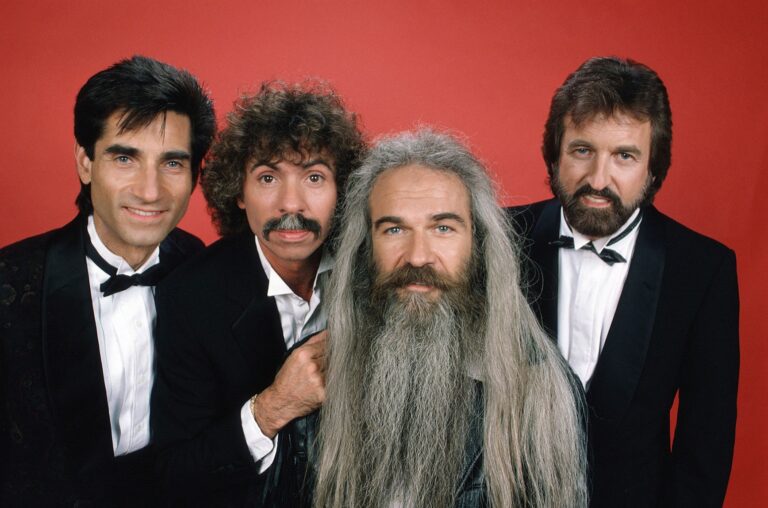Joe Bonsall, the renowned tenor of The Oak Ridge Boys, bid his final farewell on July 9, 2024, after a valiant battle with Amyotrophic Lateral Sclerosis (ALS). This marks the end of an era for the country music band and a deep loss for fans worldwide. Let’s delve into the journey of this beloved vocalist, his contributions to the group, and the lasting impact he left on country music.
Who Was Joe Bonsall?
Born on May 18, 1948, in Philadelphia, Joe Bonsall grew up with a passion for music. He was the son of Joseph Sloan Bonsall Sr. and Lillie Maude Collins. Joe’s journey into music began with the Keystone Quartet, a stepping stone that would eventually lead him to join The Oak Ridge Boys in 1973. His powerful tenor voice became a signature of the band, contributing significantly to their distinct sound and immense popularity.
What Was the History of The Oak Ridge Boys?
The Oak Ridge Boys’ story began in 1943 under the name The Oak Ridge Quartet. Originally a gospel group founded by Wally Fowler, the ensemble included Lon “Deacon” Freeman, Curly Kinsey, and Johnny New. However, it wasn’t until 1977 that the group officially transformed into a country music sensation, with members Duane Allen, William Lee Golden, Richard Sterban, and Joe Bonsall.
Bonsall’s arrival in 1973 marked a period of dynamic growth for the band. Under his vocal influence, The Oak Ridge Boys transitioned from gospel to country music, a move that would define their identity in the American music landscape. With hits like “Elvira,” they captivated audiences worldwide and became a mainstay in country music history.
How Did “Elvira” Propel The Oak Ridge Boys to Stardom?
The release of “Elvira” in 1981 was a defining moment for The Oak Ridge Boys, catapulting them to international fame. Written by Dallas Frazier, this catchy tune became a signature song for the band, thanks in no small part to Joe Bonsall’s vibrant tenor. The song was featured on their fifth album, Fancy-Free, which became the band’s best-selling album. The song’s success was staggering, selling over two million units and achieving platinum certification.
The popularity of “Elvira” and other hits like “Bobbie Sue” (1982) and “American Made” (1983) solidified The Oak Ridge Boys’ status as one of the premier acts in country music, bringing them a slew of awards, including five Grammy wins and multiple gold and platinum records.
What Was Joe Bonsall’s Impact on The Oak Ridge Boys?
Joe Bonsall’s contribution to The Oak Ridge Boys goes beyond his role as a tenor. His dynamic stage presence, vocal versatility, and genuine love for performing played a significant part in the group’s ongoing appeal. Over his 50-year career with the band, he was instrumental in the creation of over 30 albums and countless tours. His influence was felt during the peak years of the 1980s, a period marked by multiple hit records and sold-out shows.
Bonsall also played a critical role in maintaining the group’s relevance into the 21st century, contributing to albums like Rock of Ages: Hymns and Gospel Favorites (2015) and 17th Avenue Revival (2018). The Oak Ridge Boys sold over 41 million records during their illustrious career, a testament to their enduring appeal and Bonsall’s talent.
How Did Joe Bonsall Balance His Music Career and Writing?
Apart from his musical career, Joe Bonsall was also a prolific author. He penned ten books, including a four-part children’s series and several works reflecting on his life and career. His writings were well-received, offering a unique perspective on his experiences and thoughts beyond the music stage. His memoir, I See Myself, is set for release in November 2024. Unfortunately, Bonsall will not be here to see his story reach readers, but his words will continue to inspire.
What Is Joe Bonsall’s Legacy?
Joe Bonsall’s legacy is a rich tapestry woven with melodies, memories, and stories. As a member of the Country Music Hall of Fame and the Grand Ole Opry, his contributions to the genre are well recognized. His work with The Oak Ridge Boys helped shape the sound of American country music, and his life was a testament to passion, perseverance, and dedication.
His passing, after a nearly four-year battle with ALS, has left a void in the hearts of fans and the music community. He was not just a singer but a storyteller, a musician who used his voice to connect with millions, and an author whose words offered a window into his soul.
What Is Next for The Oak Ridge Boys?
With Joe Bonsall’s departure, The Oak Ridge Boys face a new chapter without their beloved tenor. Remaining members Duane Allen, William Lee Golden, and Richard Sterban continue to honor their decades-long legacy. The group is still performing, reflecting on their incredible journey, and celebrating the music that brought them together. While the future may bring new challenges, the spirit of The Oak Ridge Boys, shaped significantly by Bonsall, endures.
How Is the Music World Responding to Joe Bonsall’s Passing?
The news of Joe Bonsall’s passing has prompted an outpouring of tributes from fans, musicians, and the broader music community. Messages of condolence have poured in, honoring his contributions to country music and celebrating the joy he brought through his performances. As an iconic figure in American music, Bonsall’s influence will be felt for years to come.
How Will Joe Bonsall Be Remembered?
Joe Bonsall will be remembered as a cornerstone of The Oak Ridge Boys, a man whose voice, passion, and dedication brought joy to millions. His work both as a musician and an author highlighted his creativity and love for storytelling. As we celebrate his life and legacy, we remember the incredible impact he had on the music world and beyond. Rest in peace, Joe Bonsall – your voice may be gone, but your song lives on forever.

